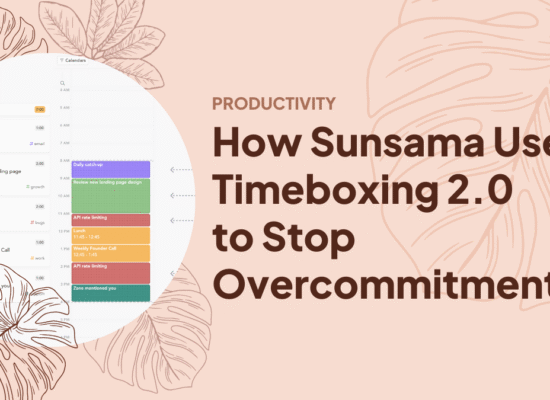Table of Contents
When we think of productivity, we often think of constant activity, long hours, and little rest. But did you know that one of the keys to true productivity lies in rest, specifically sleep?
Yes, sleep plays a vital role in our overall health and well-being. It’s not just about feeling refreshed or avoiding a mid-afternoon slump. Quality sleep has a direct impact on our mental sharpness, emotional balance, and even our capacity to take on the day’s work with gusto (Walker, 2017).
In this blog post, we’ll delve into why sleep is crucial for productivity and share practical tips on how to get enough of it. Whether you’re a busy professional seeking to boost your productivity, or simply someone who wants to make the most out of your day, this post is for you.
By understanding the importance of rest and implementing strategies for better sleep, you can supercharge your productivity and enhance your overall well-being. Let’s explore how sleep can become your secret weapon for success at work and beyond.
Understanding the Science of Sleep
Sleep is not just a passive state of rest, but an active period of crucial physiological processes. When we sleep, our bodies undertake a myriad of activities that contribute to our mental and physical wellness, and consequently, our productivity (National Institutes of Health, 2021).
What Happens When We Sleep?
During sleep, our bodies work hard on restoration and rejuvenation. This includes repairing muscle tissue, synthesizing proteins, releasing growth hormones, and consolidating memories (National Sleep Foundation, 2020). Additionally, sleep helps us clear out toxins from the brain, a process which may reduce the risk of neurodegenerative diseases (Xie et al., 2013).
All these processes directly impact our readiness to tackle tasks the next day, thus making sleep crucial for productivity. A well-rested brain is more equipped to solve problems, make decisions, and learn new information— all necessary for effective work performance.
Stages of Sleep: A Cycle of Restoration
Sleep is composed of several stages, each with its unique role in promoting rest and productivity. These stages can be broadly categorized into Non-Rapid Eye Movement (NREM) sleep and Rapid Eye Movement (REM) sleep.
- NREM Sleep: It consists of three stages. The first stage is a light sleep, where we transition from wakefulness to sleep. The second stage is when our heart rate and body temperature drop. The third stage, also known as deep sleep, is when most physical restoration occurs.
- REM Sleep: This is the stage when most dreaming occurs. It plays a vital role in memory consolidation, a critical process for learning and retaining information.
Understanding these stages helps us appreciate the intricate work our bodies do during sleep, which, in turn, can boost productivity with rest. When we prioritize sleep, we’re not just clocking in hours of downtime. We’re actively equipping our bodies for better performance, thus fostering our overall well-being and success at work.
The Vital Role of Sleep in Productivity
Sleep and productivity share a direct, scientifically proven relationship. Achieving a good night’s sleep isn’t just beneficial for our health, but it’s also crucial for maintaining high levels of productivity. Let’s delve deeper into this connection.
The Sleep-Productivity Connection
When we’re well-rested, our cognitive functions, including memory, attention, and creativity, are significantly improved. This is why sleep is crucial for productivity. Better cognitive functioning leads to enhanced problem-solving skills, sharper focus, and increased efficiency at work (Hafner et al., 2017).
Sleep also influences our mood and mental health. A lack of sleep can lead to feelings of irritability, anxiety, and even depression, all of which can hinder our productivity. On the other hand, getting enough sleep can boost our mood and make us more likely to tackle tasks with a positive attitude (Harvard Medical School, 2019).
The Consequences of Sleep Deprivation on Work Performance
A plethora of research illustrates the negative impact of sleep deprivation on work performance. A study by Hafner et al. (2017) found that lack of sleep among workers costs the U.S. economy up to $411 billion annually due to reduced productivity.
Sleep-deprived individuals are also more prone to making errors and have slower reaction times. They may struggle to focus, make decisions, or come up with creative solutions—all vital for successful performance in the workplace (Alhola & Polo-Kantola, 2007).
In essence, sleep deprivation doesn’t just lead to a groggy morning. It can lead to a significant decline in work performance, demonstrating that rest is not only important but essential for maintaining productivity and boosting our overall well-being.
By understanding how sleep helps you at work, you can start to prioritize rest and see tangible improvements in your day-to-day productivity.
The Roadblocks to Restful Slumber
While we now understand why sleep is crucial for productivity, it’s essential to identify and overcome common barriers that disrupt our sleep. By understanding and addressing these issues, we can optimize our rest and, in turn, boost our productivity.
Common Disruptors of Rest and Slumber
- Stress: Stress is one of the most common sleep disruptors. Worries about work, family, or other aspects of life can keep our minds active at night, making it difficult to fall asleep or maintain restful sleep (National Sleep Foundation, n.d.).
- Poor Sleep Habits: Irregular sleep schedule, consuming caffeine or alcohol before bed, or engaging in stimulating activities close to bedtime can interfere with our body’s natural sleep-wake cycle and prevent us from achieving quality sleep (American Sleep Association, 2021).
- Technology: Exposure to the blue light emitted by phones, tablets, computers, and TVs before bedtime can interfere with the production of melatonin, the hormone that regulates sleep. This can make it harder to fall asleep and reduce the quality of sleep (Harvard Medical School, 2021).
The Impact on Sleep Quality and Duration
Each of these factors can significantly impact both the quality and duration of our sleep. Stress can lead to disrupted sleep or insomnia, while poor sleep habits and technology use can delay the onset of sleep and decrease the amount of deep, restful sleep we get each night (National Sleep Foundation, n.d.).
When our sleep quality and duration are compromised, it directly influences our productivity. We may find ourselves struggling to focus, being less creative, or feeling more irritable at work.
Understanding these barriers is the first step towards improving our sleep habits, and subsequently, how we can boost productivity with rest. After all, having downtime and achieving restful sleep are paramount to our overall well-being and work performance.
Practical Advice for Better Rest
Now that we know why sleep is crucial for productivity and the common barriers to good sleep, let’s discuss practical tips for improving sleep. These strategies aim to create a sleep-friendly environment, establish a consistent sleep schedule, and highlight the role of diet and exercise in sleep quality.
Creating a Sleep-Friendly Environment
A sleep-friendly environment is key to getting the rest you need. Here are a few tips:
- Limit Light Exposure: Dim the lights in your home a few hours before bed and use a sleep mask or blackout curtains to keep your room dark (National Sleep Foundation, n.d.).
- Control Room Temperature: Keep your bedroom cool, between 60 and 67 degrees Fahrenheit (19.44 °C), for optimal sleep (Sleep Foundation, 2021).
- Reduce Noise: Consider using a white noise machine or earplugs to block out disruptive sounds (American Sleep Association, 2021).
Establishing a Consistent Sleeping Schedule
Having a consistent sleep schedule can help regulate your body’s internal clock and improve the quality of your sleep.
Here’s how:
- Set Fixed Times: Go to bed and wake up at the same time every day, even on weekends (Sleep Foundation, 2021).
- Create a Bedtime Routine: Develop calming pre-sleep rituals, such as reading a book, taking a warm bath, or practicing relaxation exercises (Mayo Clinic, 2020).
The Role of Diet and Exercise
Diet and exercise can significantly impact your sleep.
- Diet: Avoid large meals, caffeine, and alcohol close to bedtime. They can interfere with your ability to fall asleep or stay asleep (Harvard Medical School, 2021).
- Exercise: Regular physical activity can help you fall asleep faster and enjoy deeper sleep. Just don’t exercise too close to bedtime, as it might interfere with your sleep (Mayo Clinic, 2020).
Implementing these tips can boost productivity with rest, proving how sleep helps you at work. Remember, prioritizing rest is important and directly contributes to your overall well-being.
Managing Challenges
Despite our best efforts, some of us may still encounter sleep problems. Common sleep disorders like insomnia or sleep apnea can significantly disrupt our sleep patterns and, consequently, our productivity. It’s essential to address these issues to ensure that rest continues to boost our overall well-being and work performance.
Solutions for Common Sleeping Problems
Here are some general solutions for tackling common sleep problems:
Insomnia: If you regularly have trouble falling or staying asleep, consider cognitive behavioral therapy for insomnia (CBT-I), which helps you change thought patterns and habits that interfere with sleep (Mayo Clinic, 2021).
Sleep Apnea: If you snore loudly or feel tired even after a full night’s sleep, you might have sleep apnea. Lifestyle changes, such as losing weight or quitting smoking, can help. For more severe cases, devices, or surgery might be needed (American Sleep Association, 2021).
Remember, these are just starting points. Everyone’s sleep needs and challenges are unique.
Seeking Professional Help
If your sleep problems persist for more than a few weeks, or if they’re severely impacting your life and work, it might be time to seek professional help. Sleep disorders can be complex and require a comprehensive treatment approach, often involving several professionals (National Institute of Neurological Disorders and Stroke, 2019).
Sleep physicians, psychologists, and other healthcare professionals can provide valuable support and treatment options. A good night’s sleep is not a luxury—it’s a necessity. It’s crucial for productivity, and treating any sleep disorders is an investment in your health and work performance.
Remember, rest is important. Your downtime not only boosts your overall well-being, but it also significantly contributes to how effectively you can work. Don’t underestimate the power of a good night’s sleep!
The Power of Sleep: Real-life Success Stories
The link between sleep and productivity isn’t just theoretical. Many people have experienced significant productivity boosts by improving their sleep habits. Let’s explore some of these real-life success stories.
Story of Improved Productivity
Meet Sarah, a project manager in a tech firm. She had always considered sleep as a ‘waste of time‘ until she realized her lack of rest was impacting her productivity. “I found myself struggling to focus during the day, missing deadlines, and making errors in my work,” she recalls.
Determined to make a change, Sarah started prioritizing sleep. She developed a bedtime routine, reduced screen time before bed, and even sought professional help for her insomnia.
The results?
“I’m more focused, efficient, and my performance at work has noticeably improved. The quality of my ideas and my ability to solve problems has also enhanced,” she shares.
Testimonial on Overcoming Sleep Disorders
On the other hand, we have John, a software engineer. For years, he suffered from sleep apnea but ignored it until he could no longer. “I was always tired, no matter how early I went to bed. I could see it was affecting my work; I wasn’t as productive as I wanted to be,” John says.
After seeking professional help and starting treatment for sleep apnea, John saw a marked improvement not just in his sleep, but in his productivity as well. “I can’t believe I waited so long to address my sleep problems. I feel like a new person at work. I’m sharper, more creative, and I have the energy to make it through the day without feeling exhausted,” John shares.
These stories illustrate that enhancing sleep truly is crucial for productivity. Whether it’s making small lifestyle adjustments or seeking help to overcome sleep disorders, the journey towards better sleep is a worthwhile investment in your personal and professional life.
Remember, having downtime and rest is important—it’s how sleep helps you at work and boosts your overall well-being.
Wrapping It Up: Sleep, Your Secret Productivity Weapon
s we’ve seen throughout this post, sleep is crucial for productivity. It’s not just about the number of hours spent in bed but the quality of rest that you get. That’s why downtimes are productive—they’re your body’s way of recharging and preparing for the tasks ahead.
Remember, rest is significant. Your mind and body need time to recover from the day’s work, and that recovery process happens most effectively when you sleep. Good sleep not only boosts your overall well-being but directly impacts your performance at work. It sharpens your focus, fosters creativity, and enhances your problem-solving abilities.
So, if you’re struggling with poor sleep quality or duration, don’t hesitate to seek professional help. Overcoming sleep disorders could be the key to unlocking your full productivity potential.
We’ve shared a host of practical tips on how to boost productivity with rest—from creating a sleep-friendly environment to maintaining a consistent sleep schedule. We encourage you to give these strategies a try and see the difference they can make in your life.
In conclusion, don’t underestimate the power of a good night’s sleep. Prioritize it, nurture it, and watch as it transforms your waking hours into a more productive and fulfilling experience. Remember, the secret to enhanced productivity might just be a dream away.







No Comment! Be the first one.